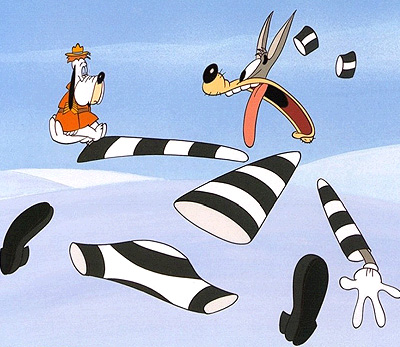BONK!

I'm corrupting my son with slapstick.
Every parent pushes something on their kids, some more benignly than others, and in my case it's comedians who hit each other and fall or spill in spectacular ways. It began innocently enough, years ago while watching a few Buster Keaton shorts. The boy, just past post-baby, walked into the room and stared at the black and white action from seven-plus decades before. Keaton has rarely made me laugh out loud -- I smile more than anything else -- but the boy found the great Stone Face hilarious, laughing and jumping about. One thing I can say about my son is that he doesn't stem or fake his joy and enthusiasm, so his happy discovery of Keaton inspired me to see what else he might like in that vein.
Though the silent comedians are a necessary primer to best understand and appreciate American slapstick, and the Three Stooges an absolute necessity, the Hollywood cartoons of the 1940s and '50s really bring this home, six/seven minute bursts of animated frenzy and immaculate timing. I've written about this before, when the boy and I were exposed to classic cartoons while bowling; but he and I have privately watched dozens and dozens of these shorts, from the unmatchable Warner Bros. output to the bargain-basement Terrytoons and Van Buren Studios, the latter of which featured as its main comic character Molly Moo Cow, who spoke no human language or had any special skill, but simply rollicked and mooed thru cheaply-drawn pastures, encountering minor dangers that Bugs Bunny would simply brush aside. But it's Tex Avery's toons that the boy really loves, which gladdens but doesn't surprise me.
Avery pushed American animation to its limits (for its time), and possessed some of the finest and sharpest comic timing I've ever seen, toon and human alike. When the boy first watched Avery's work, he said it reminded him a little of some Cartoon Network shows. As well it should -- Avery's influence is everywhere, so it's nice to show my son what the original looks like, and how much funnier Avery's shorts remain.
(One of my better-paying speaking gigs was at Villanova, where I talked about Avery's cartoons, their cultural significance and influence. But the real fun was simply showing a few of his better shorts -- nothing like getting paid to screen Daffy Duck and Droopy cartoons. My son was amazed when I told him of this gig, and he said in all seriousness, "Hey Dad, that would be a great job for you!" Tell me about it!)
All of this viewing has come in handy at his school's annual talent show, where the boy and I have performed brief physical skits to the delight of the assembled kids, but also to the consternation of a few parents who felt we were putting "unsuitable" ideas in the heads of the children. Our biggest crime came two years ago, when the lad played a strange, abusive magician and I his hapless assistant/victim. The visual punchline came when he was to pull a rabbit out of his hat, but instead produced a pair of men's underwear. I then began to shimmy and shake, reached into my pants and yanked out the missing stuffed rabbit, which brought the house down. The kids loved it; the teachers seemed split; some parents smiled, but others glared at me when I came off stage. Within days I heard from some teachers that they received several complaints about how kids were pulling stuffed animals out of their pants at home while referring to our act. This cast a mild pall over our talent show appearances since, with teachers telling us "no poop jokes, no references to butts, no hitting over the head, no kicking, and especially NO PULLING THINGS OUT OF YOUR PANTS." We still do well (I mean, the kid has a ringer for a partner -- and a director, a duty the wife handles), our most recent bit being a recreation of a simple handshake, crammed with all kinds of visual absurdity, ending with me getting creamed with a large Cool Whip pie. That old gag still works, at least with elementary school kids.
Here are a few of our fave cartoons for this extended weekend.
The first is a late Tex Avery short, when he finished his cinematic career at Walter Lantz's studios. This one really cracks us up, and is a streamlined version of some of Avery's earlier routines.
Here's the first Screwball Squirrel cartoon, Avery's violent reaction to all the cute and fuzzy animal characters that were popular at the time. My son loves Screwy, but Avery soon found the Squirrel so abrasive that he ditched the character after a few more outings.
And finally, an Avery MGM short that's the acme of extreme reaction shots.
Can't tell you how many times a week I feel like that wolf.





